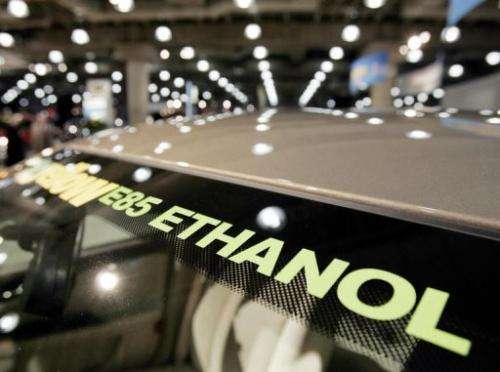US looks ahead after ethanol subsidy expires

After a series of bitter political fights, the US Congress allowed a subsidy for ethanol fuel to expire at the end of 2011, ending a program harshly criticized by environmentalists and others.
By taking no action, US lawmakers ended the credit of 45 cents per gallon refiners get for blending ethanol, which in the US market is made mostly from corn, into gasoline. Also terminated was a tariff on imports of 54 cents per gallon which was criticized by Brazil, a producer of sugar cane-based ethanol.
The programs were in place since the 1980s as a means of curbing US use of imported petroleum.
But over time, criticism grew that growing ethanol use diverted too much corn from food to fuel, and led to environmental and land use problems, by adding to incentives to plant more corn. The program also cost taxpayers some $6 billion annually.
"The end of this giant subsidy for dirty corn ethanol is a win for taxpayers, the environment and people struggling to put food on their tables," said Michal Rosenoer of Friends of the Earth.
"Corn ethanol is extremely dirty. It leads to more climate pollution than conventional gasoline, and it causes deforestation as well as agricultural runoff that pollutes our water."
"I'm gratified that these two subsidies were terminated, I've been advocating this for five to six years," said C. Ford Runge, an economist specializing in agriculture policy at the University of Minnesota.
"I think the reason they were ended is that the industry concluded they were of no particular utility. Otherwise they would not have given them up without as much as a squeal."
Matt Hartwig, spokesman for the Renewable Fuels Association which represents ethanol makers, acknowledged that the industry did not press for extending the subsidies, and argued the program was "a good model" for a way to get a new industry started.
"We believe a subsidy like this could be a good policy if implemented correctly, to build an industry, and then to fade away when the industry stands on its own two feet," he said.
He added that now is "a good time for this tax incentive to go away," but that "this contrasts with the petroleum industry which still benefits from a tax subsidy that was put in the tax code in 1916."
Analysts say the end of the subsidy may have boosted gasoline prices in early 2012, by hiking the price of ethanol, which generally makes up 10 percent of gasoline.
Yet Runge and others say the ethanol industry get ongoing support from government mandates under a law known as the Renewable Fuel Standards Act, which requires 7.5 billion gallons of biofuels to be used in 2012, and increases that to more than 20 billion by 2022.
By mandating use of certain fuels, Runge said the law "creates a guaranteed market that stimulates excess investment."
Deficit hawks and conservatives have joined environmentalists in attacking the subsidies and mandates which distort the market.
Aaron Smith of th University of California, Davis, says the mandate "is causing corn demand to outstrip supply by more and more each year, creating a vulnerable market in which even the slightest production disturbance will have devastating consequences for the world's poor."
Even though the law seeks to encourage use of more environmentally friendly biofuels derived from waste, algae and plant materials, Runge said that "the experience with corn represents a cautionary tale."
Doug Koplow of the policy consulting firm Earth Track said that the mandate is effectively another kind of subsidy for ethanol, and warns that it may be difficult to come up with new alternative fuels without adverse environmental impacts.
While there has been some enthusiasm about biofuels from switchgrass, cornstalks and algae, Koplow said, "I think people are painting that as too rosy a picture."
Even these alternatives "will require an enormous amount of land, and crops produced on a large scale. They will require chemical or water inputs," Koplow said, adding that he sees no "single solution" on fuels.
Hartwig of the industry group said every ethanol producer is seeking to diversify beyond corn "to displace as much imported oil and domestic oil as we can."
This includes biofuels from solid waste, algae and other "cellulosic" sources seen as more environmentally sustainable.
But he said it is difficult to launch these efforts without government support.
"We think it makes sense to extend tax breaks for cellulosic (biofuels) to allow them to attract investment and begin producing fuel," Hartwig said, saying that such a temporary incentive can be good policy.
"We think the incentive that just expired is a good example of how a tax break can work," he said.
(c) 2012 AFP



















